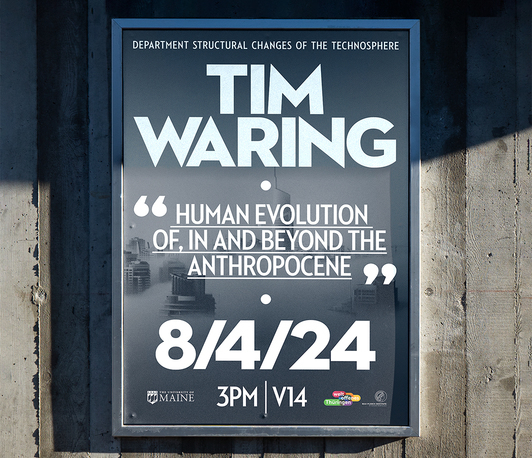Human evolution of, in and beyond the Anthropocene
- Date: Apr 8, 2024
- Time: 03:00 PM - 04:30 PM (Local Time Germany)
- Speaker: Dr Tim Waring
- Associate Professor, University of Maine
- Location: MPI of Geoanthropology
- Room: Villa V14
- Host: Department Structural Changes of the Technosphere
- Contact: rennoffice@gea.mpg.de

Lecture Abstract
Modern ecological crises can be seen as resulting from human social andtechnological evolution. However, research on human evolution is notsufficiently developed to address global environmental issues or ourspecies’ future on Earth. Theories of human evolution are numerous, poorly integrated,and are fractioned within subdisciplines. Human evolution can be betterunderstood with a set of simple principles from current research in humansociality, cultural evolution, and group interactions. From these I sketch anintegrated theory of long-term human evolution that provides a logical andtestable pattern of change across the span of our species existence andintegrates contrasting theories in anthropology and biology. This theory, andthe principles on which it builds, can be used to address our currentecological crises more effectively. I propose a global research agenda ofapplied cultural evolution for beneficial social change and analyze the exampleof cultural adaptation to climate change. I review open questions and ethicalissues in this line of inquiry. Finally, I issue an urgent call for help indeveloping applied evolutionary research for addressing human sustainability onour finite planet.
Speaker Bio
Dr. Tim Waring is an associate professor of applied cultural evolution at the Universityof Maine. He studies how culture and cooperation determine human social andenvironmental outcomes and drive human evolution. Waring’s work spans fromtheory development and empirical research to applied science, covering allscales and time periods from single organizations to the planetary longevityof homo sapiens. Waring builds evolutionary models of social andcultural change to learn how beneficial behaviors and institutions arise andpersist, and tests theoretical predictions of human behavior with behavioraland social learning experiments. His evolutionary theory of theenvironmental sustainability of human systems has been applied to case studiesaround the world. Dr. Waring also hasbeen a pioneer in the development of an appliedscience of cultural evolution for sustainability and beneficial socialchange, and leads a global applied research network on the topic. Current projects include thepatterns and processes of long-term human evolution, the role of group-levelcultural evolution in social-ecological change, the evolution of co-operativeorganizations, and cultural adaptation to climate change.
Dr Waring is on a research sabbatical in 2023-2024,during which he has focused on developing a global applied research agenda onlong-term human evolution and global sustainability. RecentInterview with Dr. Waring on the Serious Inquiries Only podcast.